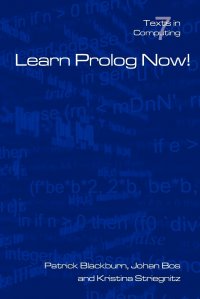Prolog is a programming language, but a rather unusual one. ``Prolog'' is shortfor ``Programming with Logic'', and the link with logic gives Prolog itsspecial character. At the heart of Prolog lies a surprising idea: don't tellthe computer what to do. Instead, describe situations of interest, and computeby asking questions. Prolog will logically deduce new facts about thesituations and give its deductions back to us as answers.Why learn Prolog? For a start, its ``say what the problem is, rather than howto solve it'' stance, means that it is a very high level language, good forknowledge rich applications such as artificial intelligence, natural languageprocessing, and the semantic web. So by studying Prolog, you gain insight intohow sophisticated tasks can be handled computationally. Moreover, Prologrequires a different mindset. You have to learn to see problems from a newperspective, declaratively rather than procedurally.Acquiring this mindset, and learning to appreciate the links between logic andprogramming, makes the study of Prolog both challenging and rewarding.Learn Prolog Now! is a practical introduction to this fascinatinglanguage. Freely available as a web-book since 2002 (seewww.learnprolognow.org) Learn Prolog Now! has became one of the mostpopular introductions to the Prolog programming language, an introductionprized for its clarity and down-to-earth approach. It is widely used as atextbook at university departments around the world, and even more widely usedfor self study.College Publications is proud to present here the first hard-copy version ofthis online classic. Carefully revised in the light of reader's feedback, andnow with answers to all the exercises, here you will find the essentialmaterial required to help you learn Prolog now. Это и многое другое вы найдете в книге Learn PROLOG Now! (P. Blackburn, J. Bos, K. Striegnitz)
Learn PROLOG Now! P. Blackburn, J. Bos, K. Striegnitz
Подробная информация о книге «Learn PROLOG Now! P. Blackburn, J. Bos, K. Striegnitz». Сайт не предоставляет возможности читать онлайн или скачать бесплатно книгу «Learn PROLOG Now! P. Blackburn, J. Bos, K. Striegnitz»
